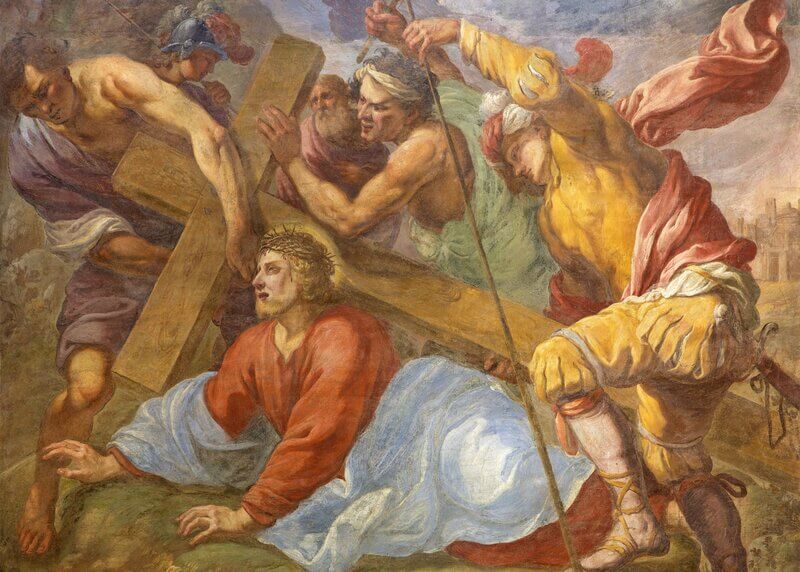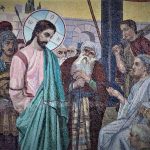Carrying Our Cross
The cross has always been the symbol of the Christian faith. Everyone knows it symbolizes the death of Christ. In the historical record, it was the means by which the Romans executed their criminals.
So what did Jesus mean when he told us to carry our cross? In the popular view today, it’s a metaphor for any form of discomfort, like having to put up with people we don’t like, or having a responsibility we really don’t want. The Crusaders of the middle ages and the Spanish conquistadors used the cross as a symbol of physical conquest. But the cross of Christ is none of these. And it’s anything but physical conquest.
In the Bible, in its simplest and purest form, the cross means unjust suffering and death. But to answer our question fully, let’s look at the story of Christ’s journey to Golgotha, the place of his crucifixion.
The Road to Golgotha
After Pontius Pilate tried Jesus and condemned him to death, Jesus was led away to be crucified. Our Lord knew what that meant. Crucifixion was the most humiliating form of punishment the Romans could devise. It was designed to be shameful. First, the criminals had to carry their own cross through the city to the place of execution. As they did, they were exposed to the scorn, pity, and hatred of onlookers. Then they were pinned to the cross through their wrists and ankles with crude iron nails. Lastly, they hung on the cross alive until they could bear it no longer, finally succumbing to the pain and deprivation.
Finally Pilate handed him over to them to be crucified. So the soldiers took charge of Jesus. Carrying his own cross, he went out to the place of the Skull (which in Aramaic is called Golgotha). (John 19:16-17)
Evidently, Jesus started out toward Golgotha carrying his own cross. He had been beaten and flogged, but wasn’t in any shape to carry the heavy wood beams the long distance. So, at some point in the journey, Jesus became too weak to carry the cross.
Simon from Cyrene
That’s when the soldiers picked a random man from the crowd—Simon from Cyrene. He was just visiting Jerusalem, and probably on the way back to his home in northern Africa.
A certain man from Cyrene, Simon, the father of Alexander and Rufus, was passing by on his way in from the country, and they forced him to carry the cross. They brought Jesus to the place called Golgotha… (Mark 15:21-22)
Simon had plans, but his plans were suddenly interrupted. And not just interrupted, but entirely overruled: the soldiers seized him and forced Jesus’ cross on him. He may have at first thought it an injustice. But when he found out who Jesus was, carrying the cross became the greatest privilege of his life.
Sharing in Christ’s shame
Simon had the privilege of helping the Son of God carry his cross up the hill to the place of his execution. But as he followed the Lord carrying Jesus’ cross, it became his own cross.
Only Jesus the spotless Lamb of God could die for the sins of the world. But as Simon trudged behind Jesus on the path to Golgotha, he was sharing the shame and disgrace that Jesus experienced as he approached his death. He identified with Christ in his suffering.
It’s certain that Simon witnessed Christ’s crucifixion. And he probably stayed long enough to see the great wonders that God worked during this event. It’s likely that Simon also became a believer in Jesus. His son Rufus is mentioned elsewhere in Scripture and was well-known in the early church at Rome. We could say that Simon represents the believer who carries his cross, identifies with Jesus, and follows him as a disciple.
Jesus calls his disciples to take up their cross
This brings us to our original question. Before the crucifixion, Jesus told his disciples:
Whoever wants to be my disciple must deny themselves and take up their cross daily and follow me. For whoever wants to save their life will lose it, but whoever loses their life for me will save it. What good is it for someone to gain the whole world, and yet lose or forfeit their very self? Whoever is ashamed of me and my words, the Son of Man will be ashamed of them when he comes in his glory and in the glory of the Father and of the holy angels. (Luke 9:23-26)
Being a disciple of Jesus is “our cross” that we carry. It involves “denying ourselves,” or dying to ourselves—self sacrifice. But being a disciple is not just carrying our own special cross. It is Jesus’ cross we are carrying. And in carrying it for him, we identify with him in his life, his shame and disgrace, and his death.
Simon may have had reservations at first. In the same way, we may resist initially. But when we come to know Jesus and who he really is, then we find that it’s a great privilege to willingly suffer along with him and bear his shame. A great reward awaits those who do. We find when we embrace the cross in faith, it seems at first to be all death. But it actually becomes the means through which God gives us life. And we become who we were meant to be: like Christ himself.
But Jesus says those who are ashamed of him and his words, he will be ashamed of them at the final judgment.
Forsaking all
As Jesus made his way to Golgotha, he knew where he was going and what the result would be. He was giving up his life, including any plans, hopes, and aspirations. His earthly life would end. He was forsaking all to do his Father’s will. In the same way, the lives of those who follow him are no longer their own. They are to live and die at Christ’s command.
In the same way, those of you who do not give up everything you have cannot be my disciples. (Luke 14:33)
And Simon experienced first hand what this meant. One moment he was living his life and minding his own business. The next moment, he was following Jesus, carrying his cross.
Christ’s sufferings prophesied
A thousand years before Christ, King David suffered in many ways that paralleled the sufferings of Jesus. They were prophetic, foretelling of Christ’s sufferings, his alienation from his family members, and ultimately from his own people. Like Jesus, David suffered shame and insults from his own people.
But I am a worm and not a man, scorned by everyone, despised by the people. All who see me mock me; they hurl insults, shaking their heads. “He trusts in the Lord,” they say, “let the Lord rescue him. Let him deliver him, since he delights in him.” (Psalm 22:6-8)
For I endure scorn for your sake, and shame covers my face. I am a foreigner to my own family, a stranger to my own mother’s children; for zeal for your house consumes me, and the insults of those who insult you fall on me. (Psalm 69:7-9)
The prophet Isaiah also described the Messiah’s future rejection and sufferings:
He was despised and rejected by mankind, a man of suffering, and familiar with pain. Like one from whom people hide their faces he was despised, and we held him in low esteem. Surely he took up our pain and bore our suffering, yet we considered him punished by God, stricken by him, and afflicted. But he was pierced for our transgressions, he was crushed for our iniquities; the punishment that brought us peace was on him, and by his wounds we are healed. (Isaiah 53: 4-5)
Outside the city gate
One of the most important sacrifices required in the Law of Moses was the sin offering, described in Leviticus chapters 4 and 5. This offering was to atone for the sins of the people. The animal was butchered, and the blood was sprinkled before the curtain of the sanctuary and on the altar. The entrails were then burned on the altar. Then the rest of the body was taken outside of the camp and burned in a fire. The book of Hebrews alludes to this sacrifice in Chapter 13:
The high priest carries the blood of animals into the Most Holy Place as a sin offering, but the bodies are burned outside the camp. And so Jesus also suffered outside the city gate to make the people holy through his own blood. Let us, then, go to him outside the camp, bearing the disgrace he bore. (Hebrews 13:11-13)
The sin offering was a picture of Jesus’ death: he was sacrificed as a sin offering to atone for the sins of the world. His sacrifice took place outside Jerusalem’s city gate where the Romans executed their criminals, “outside the camp.” This was a place of humiliation and disgrace, where onlookers could view the criminals and their punishments. Above the heads of each was written the crime they were convicted of.
Identifying with Christ
The image in Hebrews also speaks of the believer’s walk with Christ. We are to go to Christ “outside the camp, bearing the disgrace he bore.” Those who follow Jesus follow him to the place of crucifixion, sharing his shame and disgrace. In identifying with him, they share in his humiliation. As the world poured scorn on Jesus, so also the world pours scorn on his followers.
The Apostle Paul wrote:
I want to know Christ—yes, to know the power of his resurrection and participation in his sufferings, becoming like him in his death… (Phil. 3:10)
The life of a believer is not total blessing and enjoyment. Knowing Christ involves experiencing his power, but also sharing in his sufferings. The secular world generally looks down on Christians, and part of following Christ is bearing that stigma. And many believers in parts of the world are mercilessly persecuted. Those of us who have it easier must identify with them and share in their suffering as well.
Suffering with Christ
The apostle Peter exhorted us to endure suffering:
But if you suffer for doing good and you endure it, this is commendable before God. To this you were called, because Christ suffered for you, leaving you an example, that you should follow in his steps….When they hurled their insults at him, he did not retaliate; when he suffered, he made no threats. Instead, he entrusted himself to him who judges justly. (1 Peter 2:20-21, 23)
We are following in the footsteps of Christ when we suffer unjustly and bear up under it. We’re not only imitating Christ but suffering alongside him.
… rejoice inasmuch as you participate in the sufferings of Christ, so that you may be overjoyed when his glory is revealed. If you are insulted because of the name of Christ, you are blessed, for the Spirit of glory and of God rests on you. (1 Peter 4:13-14)
We shouldn’t be surprised that following Christ involves suffering. It’s a natural part of our commitment to him. We should rejoice when we go through these trials, because we have a great reward in heaven.
The other beam of wood that we as followers of Jesus carry is his yoke. As explained in another post, wearing Christ’s yoke represents following him in service (Matthew 11:28-30). As we walk and work with Christ, he helps us carry the weight. So, as we carry our cross and share in Christ’s suffering, we also share in his comfort. Just as he did with Simon of Cyrene, Jesus is walking alongside us. As we suffer with him, he is also guiding and teaching us in the true way.
Forgiveness a part of carrying the Cross
A major part of suffering with Christ is forgiveness. Jesus’ posture towards others during his trial, journey to the cross, and the crucifixion itself was one of forgiveness. He would never have gone through all of this were he not forgiving his accusers and persecutors. In the same way, those who identify with Christ and carry his cross are obligated to take the same position toward others.
And forgiving others always involves suffering. When people sin against us, we forgo our rights to be compensated for damage done to us, and we forgo any desire for retaliation. As Dietrich Bonhoeffer, German Theologian and Nazi dissident wrote:
My brother’s burden which I must bear is…. quite literally his sin. And the only way to bear that sin is by forgiving it in the power of the cross of Christ in which I now share….Forgiveness is the Christlike suffering which it is the Christian’s duty to bear. (Dietrich Bonhoeffer, The Cost of Discipleship)
As we are carrying our cross, we carry with us the love and forgiveness our Savior had for others. And we imitate him as he gave his life for his persecutors.
Carrying our cross—the mark of a true disciple
Taking up our cross means following Jesus to the place of crucifixion. In sharing Christ’s disgrace, dying to ourselves, and living a life of forgiveness, we become his disciples. In fact, this pattern of life is the mark of a true disciple. What a great privilege we have in following and identifying with Christ! We share in his pain and shame, but also in his comfort. And one day we will share in his glory!
Now if we are children, then we are heirs—heirs of God and co-heirs with Christ, if indeed we share in his sufferings in order that we may also share in his glory. (Romans 8:17)
Christ in Scripture is listed on Feedspot Top 200 Christian Blogs.







4 thoughts on “Carrying Our Cross, the Mark of a Disciple”
To all Believers this is common knowledge, if not it should be. Everyday we should be one with Yeshua, I know I am. At the same time I fall short every day, in doing what I should be doing. Nevertheless, I will continue my effort to walk the walk like He did, back in His day, and do what He did as well. His sacrifice means everything to everyone who seeks eternal life, but it doesn’t mean we should do away, or ignore all that He did in that day.
Thank you for sharing such a remarkable event of Jesus. Thank for teaching me more about what happened with Jesus and what I need to do to carry the cross and to be a disciple for Jesus! I had always believed in Jesus Christ as my Savior and received him into my heart, but over the years I stopped reading my Bible consistently, stopped praying to God and stopped going to church consistently. I backslid. But now I have asked God for forgiveness, I’m doing it right now. Last Sunday was my first day of seeking God wholeheartedly! My desire is to have God close to me again, and to know his Word, and to serve God and honor God, so he will be pleased with me. Thank for teaching me more about Jesus!
Martha,
I’m so happy for you, that you are starting to seek God again, and making time for him in your life. And I’m so glad the article helped you in your understanding of what it means to follow Jesus. Stay close to him!
Blessings, Scott
This was meaningful and of great support to me. Thank you, Scott. ✝️?☀️?
Moss ?